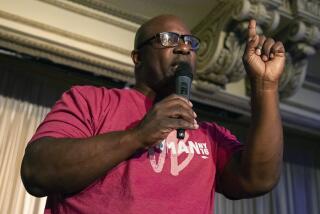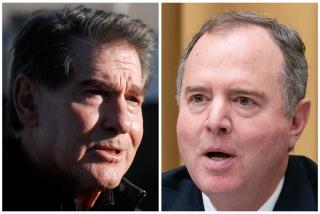Election Day Partisans Get Their Rematch
- Share via
WASHINGTON — The fight over John Ashcroft’s nomination as attorney general is a Janus-like political event, with one face looking forward and another looking back: While it is the first big struggle of the incoming Bush administration, it also is another--perhaps the last--chapter of the 2000 election saga.
The Ashcroft drama is shot through with the themes and passions of the disputed presidential contest, as fierce opposition to the former Missouri senator has been led by African Americans and other Democratic activists who remain enraged by the Florida recount and believe George W. Bush stole the election.
“If the African American vote had been counted rather than hijacked in Florida, there would be no Bush presidency and no John Ashcroft,” said Yvonne Scruggs-Leftwich, executive director of the Black Leadership Forum.
Core Democratic constituencies have made plain that Senate Democrats who vote to confirm Ashcroft do so at their political peril. In that sense, the battle also looms as the opening skirmish of the 2002 and 2004 elections, analysts say.
And it’s not only Democrats under the gun on the matter; Ashcroft foes hope to make the vote a tough one for moderate Republicans up for reelection in 2002. The plan is to turn Ashcroft into the new Newt Gingrich, the personification of the GOP’s most controversial brand of conservatism.
“A vote to confirm John Ashcroft is going to become shorthand for a brand of extremism that they’ve been doing their best to shed over the years,” said Jim Jordan, executive director of the Democratic Senatorial Campaign Committee.
Ringside Seats Highly Coveted
The heavy artillery rumbled to the front lines of this grand political battle Tuesday, as the Senate Judiciary Committee opened hearings on Ashcroft’s nomination. It was an event of high expectations, held in one of the Senate’s largest hearing rooms to accommodate the reporters, camera crews and lobbyists who all sought a ringside seat for the first test of Bush’s ability to get his way in a Senate evenly divided between Republicans and Democrats.
The 2000 election cast a shadow over the hearing in another way: Ashcroft was introduced to the committee by Sen. Jean Carnahan, the widow of the man who beat Ashcroft in his reelection bid last fall. Her husband, Missouri Gov. Mel Carnahan, died in an airplane crash a few weeks before the vote, and she was appointed to fill his seat after he won the race anyway.
It is the custom in Senate confirmation hearings for nominees to be introduced by their home-state senators, and Carnahan followed that custom. She even alluded to the unlikely chain of events that had led to the moment. “Three months ago this very day, I could not possibly imagine that I would be here,” Carnahan said. “I suspect Sen. Ashcroft could say the same.”
Ashcroft’s supporters on Tuesday invoked his behavior in the Senate campaign, citing the gracious way he immediately conceded defeat--rejecting calls from some that he challenge the legality of a dead man winning the election.
“The people of America saw the true heart of John Ashcroft in the way he handled the tragic death of Mel Carnahan,” said Sen. Kay Bailey Hutchison (R-Texas). “He showed magnanimity in defeat.”
But the passions of the more bitter presidential campaign of 2000 simmered not far below the surface as Democrats on the Judiciary Committee trained their fire on Ashcroft’s record on civil rights issues. That focus on racial politics tapped directly into the festering wounds of black Democrats who believe they were disenfranchised by the Florida vote count, which determined the outcome of the presidential race.
“Florida adds to the emotionalism [of the Ashcroft debate] because the same issues are at stake,” said Mark Mellman, a Democratic pollster. “For the African American community, the issue in Florida was civil rights; the issue in the Ashcroft hearing is his commitment to civil rights.”
Whether or not Democrats thwart Ashcroft’s nomination, they figure the civil rights debate is a winning issue for them.
“It’s good for Democrats to have [Bush] and his most visible nominees spend the next three to four weeks saying they’re not racist,” said a Democratic strategist who asked not to be named. “Certainly the energy and vitriol that interest groups are putting into this is directly related to the bitterness that emerged out of Florida.”
The antipathy toward Ashcroft among liberal interest groups boiled over before the hearing even began. Women’s groups opposing him--in large part because of his fervent opposition to abortion rights--held a news conference and a street demonstration outside the Capitol on Tuesday. Although they acknowledged that defeating Ashcroft would be an uphill battle, they said they hope to sway senators by portraying him as a conservative extremist out of step with the mainstream.
And officials for some of the groups did not hesitate to threaten political reprisals against senators who vote for Ashcroft.
“It could mean a rude awakening to senators in their next elections if they vote yes,” said Patricia Ireland, president of the National Organization for Women. “We’re counting on a mobilized, experienced, angry group of constituents across the country to bring pressure on every senator.”
That’s why strategists expect that many of the Democratic votes against Ashcroft most likely will come from among the 14 senators facing reelection in 2002, when the party hopes to regain control of the chamber--and from those who harbor presidential ambitions in 2004.
‘No’ Vote Safe for White House Aspirants
“We’re at the beginning of the 2004 cycle, and this is the first opportunity to make an impression,” said one Democratic political consultant who asked not to be named. “The safe course for anyone running for president is to vote no.”
As many as 12 Democratic senators have been mentioned as possible presidential candidates, with the most prominent including Evan Bayh of Indiana, Joseph R. Biden Jr. of Delaware, John Edwards of North Carolina, John F. Kerry of Massachusetts, Joseph I. Lieberman of Connecticut and Hillary Rodham Clinton of New York.
The calculation for some of the senators up for reelection in 2002 may be more complicated. For instance, two from the South--Max Cleland of Georgia and Mary Landrieu of Louisiana--represent states that tend to be conservative overall and that Bush carried. But the states also have large black populations that Democrats count on to turn out in large numbers for the party.
Also potentially on the spot is Carnahan, who under Missouri law was appointed to the Senate seat only through 2002. She has been under some pressure in Missouri to support Ashcroft strictly as a matter of state pride, but that could cost her vital support from core Democratic constituencies if she seeks a full six-year term.
The confirmation debate also should provide the first real glimpse of the political dynamics of the evenly divided Senate. The partisan cross-fire that marked the first day of hearings does not bode well for bipartisan hopes. The Judiciary Committee’s top Republican and Democrat were reduced to squabbling over when witnesses would testify.
“For a Senate that has talked so much about bipartisanship, we haven’t gotten off to a very good start,” said Sen. Arlen Specter (R-Pa.). “Feelings are running very, very high.”
*
Times staff writer Nick Anderson contributed to this story.
More to Read
Sign up for Essential California
The most important California stories and recommendations in your inbox every morning.
You may occasionally receive promotional content from the Los Angeles Times.











